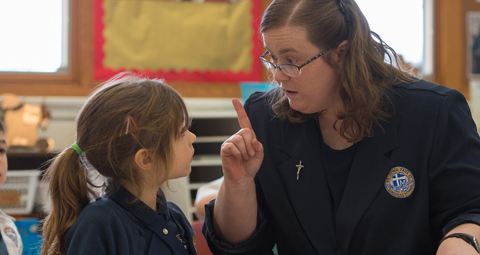BY Daniel Harkins | February 17 | ![]() 0 COMMENTS
0 COMMENTS ![]() print
print

In their own words: teachers tell us how to tackle the staff shortage
As schools across Scotland struggle to deal with a shortage of teachers, DANIEL HARKINS speaks to education professionals to get their views on the problem, its complexities, and how the Church and society can encourage more people to pursue a teaching vocation in a Catholic school
During last year’s Catholic Education Week, Archbishop Philip Tartaglia warned of the ‘significant consequences’ if more teachers could not be found for our schools. One year on and the problem in both non-denominational and Catholic schools is still so severe that the General Teaching Council for Scotland recently launched a campaign to recruit teachers from as far as Australia and Canada. Here, Scotland’s teachers in their own words give us their view on the problem and how we can solve it.
Jane Barrett, probationary teacher, Sacred Heart Primary School, Falkirk
Unfortunately it seems our generation do not place the importance on religion as strongly as our parents did and therefore do not feel it is necessary to only apply to Catholic schools to teach. The job itself is the priority more than the position of choosing to work only in a Catholic school.
As a probationer I have the choice to tick the box to work only in a denominational school or the box to work in any. As a Catholic teacher and working in a council with only eight Catholic schools out of 53, I would be limiting myself to a permanent contract if I chose only to work in denominational schools.
However I have always been a practising Catholic, have ten years experience leading a Children’s Liturgy group and my Faith is very important to me. I would dearly love to continue working within a Catholic school—it’s a difficult decision as at the end of the day as I still have three children to feed.
The reduced number of Catholics in general nowadays is an issue—a lot of children in my school don’t make their First Communion; some do then never go back!
Many have not been Baptised but are here because it’s their local catchment school. When I was at school in the 1970s everyone in the class made their communion.
Perhaps universities going into primary schools as well as high schools to promote Catholic teaching may help, or we could encourage Catholic teachers to make appeals in church.
Hugh O’Donnell, teacher, Dunoon Grammar School
I am eager to work in a Catholic school but fear that local authorities may appoint a more economically viable teacher instead. I’ve been to a couple of Catholic schools but have been unsuccessful. I think I may be too expensive. To move and remain a classroom teacher, I am competing against other practitioners who are on a pay scale between 25 and 35 thousand. I achieved .4 on the Chartered Teacher Scheme before it was pulled: I am on close to 41,000.
Still, I have taught for 12 years, ten of which were dealing with the most difficult S3/S4 single gender (boys!) classes. I have a number of Postgrads, an MSc and I have submitted a PhD application… so, who knows why I am still ‘stuck’ in Dunoon?
There is a vacancy in Dumbarton that I probably won’t consider, even though I am desperate to work in a Catholic school where I can be a positive male role model who loves and openly practices his Catholic Faith. I do profess my beliefs in my own non-denominational school. Yes, God probably wants me to be out spreading the Good News.
Danielle Timmons, depute head at St Vincent’s Primary School, East Kilbride, and Scottish teacher of the year
The teaching job has changed so much, even in the last five years, so it is harder getting people in the door. I’m involved in the interviewing process at Glasgow University and there are plenty of students putting themselves forward for the Catholic education programme. When we ask them why, probably the strongest answer for a lot of them is that they want to be part of the Catholic ethos of the school and they want to deliver their Faith and lead by example.
It’s just sticking it out that is the issue—I don’t think people realise that before they get into it.
Looking back at my own course we started with 250 students and 120 of us graduated. Students go into it straight from school and often expect an easy ride and don’t realise how much time it takes.
So you think you are getting 250 students in the door but you actually only end up with half of that. We should make secondary schools pupils aware of what the job entails before they start applying to universities.
It’s not a nine to five job. It will take a lot out of them, but it is such a rewarding job.
Publicity for the teaching industry right now probably isn’t the best but if we keep showing our love for the job then as long as people—we have ten teaching students in our school each week—see how much we love our job then hopefully they will pick up on it.
Paul McLaughlin, head teacher, St Ninian’s High School Kirkintilloch
Our school hasn’t suffered too badly. We have been lucky, touch wood. Often the problem can vary depending on your area.
What we do have is a list of retired teachers who we can rely on. Each local authority have a pool of supply teachers but the pool can be empty by the time you need it so if you have your own people who are known in the school and are happy to come back then that is useful.
It’s not a long-term solution but it is how you can get by when you have things like long term sickness. They are teachers who have worked here, who are retired, who we know, but are not bothered about going on the supply list. They are available and happy to help out and it’s useful to keep in touch with those people.
Pauline Barr, RE teacher, St Peter the Apostle High School, Clydebank
The shortage of Catholic teachers and those who can teach RE in particular is a growing concern, however it is encouraging to see initiatives devised to meet this shortage. I think perhaps it’s something that we could take more steps to promote in our own Catholic schools in order to support our young people who are pursuing teaching careers.
Catholics completing teacher training qualifications and probationary years ought to be placed in Catholic schools for each placement. Otherwise, it is tricky to ensure that those completing the RE qualification are given adequate opportunities to teach RE and work with Catholic RE departments who can provide the support and guidance that is required.
Without this, some may feel uncomfortable teaching RE once qualified as they have had little experience in the Catholic school. This in turn can affect how confident that teacher is in the RE classroom compared to their specialist subject.
Orla Fowler, headteacher, St Joseph’s Primary School, Aberdeen
There is a shortage of applicants for teaching positions in Catholic schools in Aberdeen. We have tried different things to recruit candidates over the years.
Aberdeen can be an expensive city to live in; young people starting their career do not have a lot of money to spend on rent. Relocation packages and help with finding accommodation are available through the council.
While there is no Catholic secondary the Catholic primaries hold a prominent place in the city and places are much sought after. We have attracted people from Belfast and the Republic of Ireland in the past but retention of these teachers can be challenging if they feel far from family support networks.
The wider Catholic community is warm and welcoming and very family oriented. A lot of teachers here in St Joseph’s are involved in delivering the children’s liturgy in their parish and we encourage that. It’s a great way to get to know people. Some people have met their life partners through the Church! There’s a ready-made community that Catholic schoolteachers can join. We have that to offer: community and parish. Things you might not find in other schools. We should build that into recruitment
Christopher Morris, teacher, St Saviours Primary School, Govan
Our year group at university was huge but the number of men was tiny. People seem to think primary teaching is a job for women. That’s the modern perspective on it. A lot of it has to do with the fact that there is so much more nurture involved in primary school education than their used to be. You can be seen as a kind of mother figure, and obviously men don’t aspire to be mothers.
What we need to do as a Church and a society is to realise that to have a nurturing, caring, gentle manner with children is a manly thing to have. It’s not about being strict and unapproachable—being nurturing and caring is a manly thing, a fatherly thing, to do. To have a good team in a school you need to have a mix of personalities and that does include having the two sexes. For children it does make a big difference.
When I came into Govan I noticed that at first a few boys could be quite hostile but after about six months things started to change. The problem wasn’t with me personally—the problem was that they were used to men coming and going in their lives so they didn’t want to get attached.
Boys can be a bit wary of men if they have experience of not having a very good relationship with them. Having those positive role models does make a big difference.
I’m amazed that there has never been a big advertising push for male primary school teachers. I’ve never heard people say we need to have a conscious effort to attract and retain more men in the primary sector.
Feeling isolated can be an issue in primary schools for men. I was in a school that had several men and it did make a big difference because guys do think differently and when you are the only one it can sometimes be difficult to relate to things, both personally and professionally. There have been times when I’ve had different approaches to things than colleagues and there has been an attitude that, because I was a man, I couldn’t understand an issue. There can be some casual sexism without people realising it.
The Church has a role to play if we understand teaching as a vocation, and I certainly see it as a vocation: that’s why people give much more than their contract requires.
The Church must help young men discern that their vocation could be to teaching. To see it from the perspective that our vocation as Christians is to love and the most important thing that you need in the context of education these days is love—and that requires the love of women and the love of men.
We need that complementarity of the sexes—children certainly need that, especially with some families breaking up and relationships being unstable.
The Church could highlight that primary teaching is for young men and encourage people to think of it in different terms—as something that is not just for women but as a vocation to love and a vocation to love children, most especially those children who are most vulnerable.











